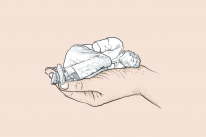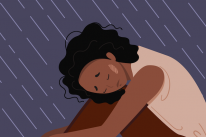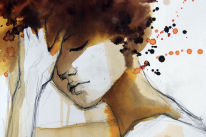
“It was not your fault, even if you were drunk, even if you were wearing a low-cut mini-dress, even if you were out walking alone at night, even if you were on a date with the rapist and kind of liked him but didn’t want to have sex with him.” ~Joanna Connors
Child sexual abuse victims who speak up are incredibly brave and vulnerable. If a child comes to you for support, be mindful of your energy and reactions. If you need to ask them questions to get a better understanding, be mindful of your tone, body language, and intonation.
When I experienced sexual assault at the age of thirteen, I didn’t tell anyone because I was afraid that I would be punished.
I grew up in a home where I was trained to not show too much skin and to always avoid the male gaze. The day I was raped, I was wearing a skirt. I knew that, somehow, I would be blamed and punished, so I stayed quiet.
As an adult, I learned through spirituality that I needed to change how I viewed rape survivors and myself. None of us “asked for it.”
When addressing a rape survivor, it’s important to use consent-oriented etiquette and language. There are a variety of words and phrases you should never say.
Be gentle with sexual assault survivors. Rape is a delicate and triggering topic. If someone comes to you for help, ask them what they need and if there is anything you can do for them.
Listen. Check in on them.
Look past your judgments of the situation and just be there to support them as best you can. Be sure to take care of yourself and your energy while helping others.
Typically, I would only ask questions if you need to. Some people do not wish to share details of a traumatic experience. This is understandable.
If you are required to ask some of the following questions for an investigation, be sensitive to your tone. Avoid judgment and any phrases that sound judgmental.
It can even be helpful to say, “Rape is never the victim’s fault. I just need to ask you a few questions to get a better picture of what happened. Is that okay with you?”
Only say what needs to be said. Only ask what needs to be asked. You may want to dig deeper, but you might end up saying the wrong thing and retraumatizing them further.
Rape survivors need to be heard.
How would you want to be treated if you went to someone for help? Give them the most compassion and unconditional love you can channel from your innermost being. That’s the best way to support them.
To shift from our current rape culture and into a culture of consent, we must change the mindless, go-to reactions that we have toward victims of sexual abuse.
Why is it common to ask, “Was she drunk?” Why do people inquire about what someone was wearing at the time of a sexual assault?
It’s common because society has taught us to judge instead of love. In a culture of consent, the mindset is different.
In a culture of consent, we know that it doesn’t matter if someone was drinking. No one deserves rape.
In a culture of consent, there is less blame and more compassion. Compassion is key when it comes to creating a culture of consent.
Compassion in a culture of consent means extending unconditional love to sexual assault survivors. We can no longer live as we are as a society. The time for change is now.
To implement this cultural shift, we can only start with ourselves, our thoughts, and our reactions toward rape survivors.
I created the following list to help you take one major step in that direction.
44 Things to NEVER Say to a Rape Survivor
1. What were you wearing?
2. Were you drunk?
3. How did it happen? (Ask them if they are comfortable with sharing what happened. Listen mindfully and don’t oversteer their story. Respect how they share their story. Refrain from interrupting so they know they have the freedom to express themselves. This question is only necessary for law enforcement officials and healthcare professionals who are required to know the details in order to help the survivor.)
4. Did you scream?
5. Why didn’t you scream?
6. You really need to get a gun.
7. I know a self-defense class that you should go to.
8. Your outfit was very sexy.
9. How could that happen to you, again?
10. Did you say “no”?
11. Did you fight back?
12. You’ve already had sex, so, what’s the difference?
13. You’re a guy, you’re supposed to like it.
14. Rape is every guy’s dream. (A girl said this to me while I was making consent-based chalk art in NYC in 2015.)
15. How can a girl rape a boy?
16. Rape can’t happen during marriage.
17. There’s no use in crying about it.
18. You need to let go of your anger.
19. Are you sure it was rape?
20. Weren’t you dating?
21. Why didn’t you get a rape kit?
22. Have you had sex since?
23. You should have yelled “fire.”
24. Why haven’t you reported it?
25. I thought you liked him/her/them.
26. It’s your fault.
27. You shouldn’t have gone with them.
28. You were asking for it.
29. You attracted that.
30. You led them on.
31. That’s not rape.
32. That was sex. You could have avoided it.
33. You should have protected yourself.
34. You shouldn’t have been out late.
35. You shouldn’t have been drinking.
36. You shouldn’t have gone to that party.
37. That would never happen to me.
38. You’re smarter than that.
39. Stop putting yourself in situations like that.
40. It could be worse.
41. Get over it.
42. It’s not that big of a deal.
43. I hope you learned your lesson.
44. There are some things you could have done differently.
Instead of blaming or shaming someone who has been traumatized, hold back those thoughts. Focus only on how you can be a friend to them in their time of need. If they came to you for help, it means that they trusted you.
Spirituality helped me see my power and the importance of my voice. It taught me to have compassion for myself and fellow survivors. Sexual assault recovery can be catapulted when the rape survivor has a loving, supportive team of people who they can go to in times of need.
How can you create this type of safe space for the sexual assault survivors in your life? How can you create this safe space for yourself?
About Amber Amour
Amber Amour is a holistic healer and spiritual coach who specializes in working with sexual assault survivors of all walks of life: LGBTQIA+, adult entertainers, and more. Her Consentopia ebook series explains everything you need to know about consent and how to heal after sexual assault. Visit her on Instagram on @realamberamourand @ancestralessentials, on YouTube , on SoundCloud, and visit her site at www.amberamour.com and her store at www.ancestralessentials.com.













 Though I run this site, it is not mine. It's ours. It's not about me. It's about us. Your stories and your wisdom are just as meaningful as mine.
Though I run this site, it is not mine. It's ours. It's not about me. It's about us. Your stories and your wisdom are just as meaningful as mine. 